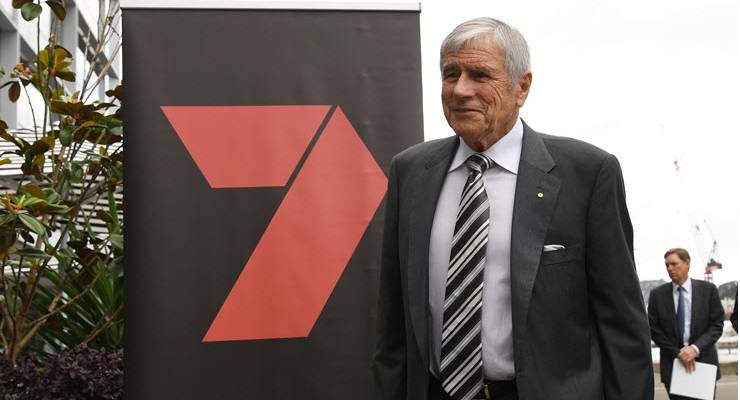
Legacy media is among the most impacted by the COVID-19 pandemic and measures taken to control its spread, judging by ASX filings from Seven’s regional network affliate Prime Media Group (and an earlier update from Nine Entertainment).
On Tuesday, Prime revealed its April revenue slumped by $6 million or more than 38%. That, in turn, has seen a 12.7% slide in revenue for the 10 months to the end of April.
So why hasn’t Seven West Media in particular, released a similar update for April?
After all, if its regional affiliate saw such a large fall, why not the struggling Seven West Media? Seven’s TV ratings and viewing performance so far this year has been appallingly bad. Dud shows have seen viewers desert the once-leading network.
But it hasn’t said a word about its operational performance at all except to tell the market in March that it was withdrawing its profit guidance for the year to June. Since then it received $40 million for Pacific Magazines from German-owned publisher Bauer last Friday, paid after Seven threatened court action.
But the cost was terrible — over 140 jobs at Bauer before the deal was completed and 60 at Pacific after the settlement.
That’s a lot of blood to keep the financially-diminished media empire of Kerry Stokes alive (he owns more than 40% through Seven Group Holdings).
All that Seven West has said in the past month is about the Pacific sale and to confirm that it is interested in selling its Perth offices — again to raise cash.
The shares remain at just over 8 cents, valuing the company at a miserable $127 million. There have also been stories about 20% pay cuts to Seven staff and a claim that the company is trying to use the JobKeeper facility because of a downturn in revenue.
But not a statement to the ASX about these key points, even though a host of other companies have updated the market several times on job cuts, pay cuts, management and board cuts, other cost saving measures, new capital raisings and debt.
Seven West’s statement on March 24 withdrawing its guidance for the year to June talked about how tough conditions were, but didn’t mention cost or job cuts or revenue performance.
Rival Nine Entertainment revealed on Monday that its free to air TV revenue fell 29.8% in April (with 9% of the fall due to the lack of NRL rugby league games). Nine told a Macquarie investment conference that its May revenue would likely be down on April.
Nine also said its TV costs were down 7% so far in 2019-20 and it is looking for a 19% drop in the June half, excluding NRL costs. Radio revenue (through Macquarie) fell 12.4% in the March quarter, while costs are down 6%.
All valuable updates, especially when compared to the silence at Seven.
Oddly, while talking up its streaming video service Stan, Nine did not give an updated figure for the number of subscribers so a comparison could be made with past data.
Nine did say Stan’s revenue was running at an annual rate of $250 million in May, which is meaningless. Nine did say there had been a 21% jump in viewing on Stan in the past three months, with a graph that illustrated viewing in hours, not subscriber numbers.
Nine said there had been “strong growth in active subscribers” but that doesn’t mean new customers, only that existing subscribers had been doing more viewing.
Could Stan’s subscriber growth have peaked? If there had been solid growth you would have thought Nine would have given a figure and a comparison because Stan is a rare growth option in the COVID-19 world at the moment (as Netflix showed last month by more than doubling quarter subscriber growth to over 15 million).
Nine said that digital subscriptions at its metro newspapers (The Age, The Sydney Morning Herald and The Australian Financial Review) were up 13% so far in 2020 (that’s a growth figure that was absent from the talk about Stan).
But Nine did warn that there was “pressure on print circulation and advertising revenues” which is what News Corp also said last month in its update/warning to the SEC and ASX.
But not a word from Seven about the performance of TV revenues, advertising (its ratings performance has been appalling) or about the performance of its newspapers in WA, led by the West Australian.








Wouldn`t it be wonderful to wake up one morning and find commercial T.V off the air and only the ABC and SBS on the screen and all those right wing Murdoch navy pretend journos on the newstart payment that they rosey for news limited propaganda.
Typical of this govt and frydenberg to allow companies like qantas, Crown and Seven to collect JobKeeper. There should be some sort of means testing for companies, expecting them to pay for keeping staff on themselves. Instead, they rule out institutions like unis and some workers whose employers are foreign owned companies, selectively of course.
I know journalist are fascinated by journalists and media organisations. But I am weary of hearing the daily chronicle of the demise of ‘legacy media’ without hearing any suggestions for solutions.
Kerry Stokes has an arrogant “tell ’em nothing” attitude to public company governance. Given the billions lost by the shareholders of Seven West Media he should resign as chairman and give someone else a go.
I, for one, look forward to the breaking up of the far too many “too big to fail” empires – most of which attained their once overweening wealth & power by buying up or crushing competitors rather than excelling in their fields.